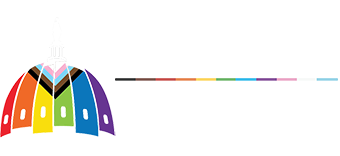Reflections on Pride: Celebration and Protest
“Is Pride a celebration or a protest?” This question has been front and center in our community this year and, as leaders of the Capital Pride Alliance, we have sought clarity by examining our own history more closely. In 1970, Pride began as a commemoration of the Stonewall Riots of June 1969. The first annual celebration began in Washington in 1975 with a street festival started by Deacon Maccubbin, the owner of Lambda Rising bookstore. We have never forgotten that our events were born in protest. The simple act of being visible has been, from the beginning, a political statement, and coming together for any event represents a form of protest against those who would deny us our rights – or for some, our very existence. That remains true today in our current political climate.
The 2016 election results were a jarring reminder that the astounding gains our community has made over the past several years should not be taken for granted – and that, for many of us, the right to marriage is not necessarily the most pressing priority in our ongoing struggle for full equality. As our climate shifts, so must our strategies and tactics as a movement. We must further explore how the intersections of our sexual orientation and gender identity, race and ethnicity, age and social class, and myriad other issues impact our experiences as members of the LGBTQ+ community and in society at large.
Within a matter of weeks, the United States went from having one of the most progressive and LGBTQ-supportive Cabinets in history to one filled with individuals who have been openly hostile or simply indifferent to our struggles. After rolling back much of the progress we saw under the Obama administration, particularly the removal of Title IX guidance for transgender students, we now face the executive order the LGBTQ+ and other communities have dreaded: a divisive and unconstitutional directive that legitimizes discrimination in the guise of “religious freedom.” And make no mistake, we all realize that every executive order has impacted LGBTQ+ people, from the immigration ban to healthcare policy changes. Now is the time for us to act in solidarity, even when we may disagree on tactics or approach, and face together those who seek to harm us.
This year, Capital Pride has come under fire about several issues, and we think it is best to dialogue openly and respectfully about them – to share our process and invite our community to join us in it.
First, we understand that throughout our history, LGBTQ+ people and people of color have experienced a disproportionate amount of violence at the hands of police – both individual bad actors, as well as systemic policies and practices that target marginalized communities. The spark that lit the Stonewall Riots in 1969 was a result of this long-standing police harassment – and those struggles continue today. Not a week goes by that we do not see members of our community, especially trans women and black men, harassed or killed at the hands of law enforcement officials somewhere in our country. We must do more as a community to fight against these injustices.
And, yet, we know how powerful it is to have openly LGBTQ+ people serving in the ranks of the Washington, D.C. Metropolitan Police Department (MPD) and elsewhere around the country. Many of them joined the force to create positive change and protect the most vulnerable among us. MPD, although far from perfect, has embraced many key reform initiatives and is striving to serve as a model for progressive, community-based policing. In Washington, we have had trans women of color at the forefront of advocating for and changing the culture in the MPD and other agencies, ensuring that we drive reform from within the system as well as outside of it.
The presence of police at our events is also a matter of public safety, particularly in light of concerns following the deadly 2016 shooting at Orlando’s Pulse Nightclub. In the immediate aftermath of that horrific event, local and federal law enforcement ramped up efforts to ensure that everyone remained secure during the 2016 Capital Pride Festival and Concert. Large public gatherings, by their very nature, are vulnerable to anyone with animosity and access to weapons. We greatly appreciate the efforts that our law enforcement partners put into making our events safe for all.
The issues surrounding corporate sponsorship can be difficult. On the one hand, the booths at the Festival and the floats in the Parade that are underwritten by businesses are staffed with LGBTQ+ people and our allies. Often, those employees have strongly encouraged their employers to financially support Capital Pride. Moreover, during the past decade, the business community has contributed greatly to the fight against anti-LGBTQ+ discrimination; they certainly did in Indiana and North Carolina and are poised to do so again.
On the other hand, our corporate sponsors ought to meet a certain bar of ideological agreement to participate in our events. As an organization, we will articulate a more transparent set of criteria for our corporate partners in the coming months. In the meantime, we feel is it important to clarify that our funding sources are intentionally diverse, so we are never dependent on any individual sponsor. Furthermore, in our organization’s history, no sponsor has ever asked Capital Pride to do or refrain from doing anything as a stipulation for accepting a donation. If they did, we would end the partnership.
Capital Pride is one of the largest free LGBTQ+ events in the country – it always has been, and we intend to keep it that way. Our continued presence on Pennsylvania Avenue in front of the U.S. Capitol building – a place where we need to remain because of the message that it sends to those who support us and those who don’t – requires significant resources. And entertainment, no matter how high-profile, is not the largest expense item. Were we to remove corporate funding, the events would likely have to be underwritten by ticket revenue – and this could prevent some members of our community from attending at all.
One of the great things about America is our remarkable resiliency – and our belief that people and institutions can change for the better. As a Pride organization, we know that we can only grow when we listen to each other’s lived experiences and strive to understand our community in all its beauty and complexity. This process is not easy. It requires courage and vulnerability and empathy – but we need to have these conversations together. As LGBTQ+ people, we have learned that our bravery coupled with our honesty is our greatest strength. We have made many advances precisely because we have publicly come out so that our friends, families, neighbors, and colleagues understood the struggles we encountered and endured. That process of “coming out” and speaking the truth of who you are is never completed – even within our own community.
Our continued visibility is critical now when we have an administration that seeks to take us back in time and make us invisible. We are not going to let anyone do that. We understand that our community is large and diverse, and we welcome a conversation as to how best to challenge those in authority on issues that affect LGBTQ+ people. We know we have work to do, and we need voices at the table who are truly representative of our community as a whole in order to get us there. So join us – let’s dive into the hard questions together.
After decades of work producing an event of this size and magnitude in the Nation’s Capital, we know that we must be responsive to the needs of a diverse and ever-changing population. Healthy organizations thrive in an atmosphere of respectful, empathetic, productive conflict – and it is imperative that all members of our community have a chance to make their voices heard. Capital Pride continues to be both a celebration of the progress that we’ve made – and a symbol of our commitment to the work that awaits us.
Bernie Delia,
President of the Board of Directors
The Capital Pride Alliance, Inc.

